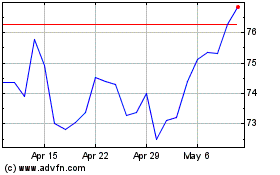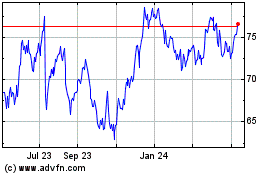UPDATE:SEC Settles With State Street On Subprime Mortgage Charges
February 04 2010 - 1:33PM
Dow Jones News
State Street Corp. (STT) on Thursday agreed to pay more than
$300 million to settle civil charges by the U.S. Securities and
Exchange Commission alleging the bank misled investors about its
exposure to subprime mortgages.
In a civil complaint filed in a Boston federal court and a
related administrative order, the SEC said the bank selectively
disclosed information about its subprime mortgage investments to
specific investors. The settlement money will go to investors who
lost money during the subprime market meltdown. The settlement is
in addition to nearly $350 million the bank previously agreed to
pay to settle private claims, the agency said.
The settlement came about following a joint investigation
between the SEC and state regulators in Massachusetts, including
the state's Attorney General and Secretary of State offices.
"State Street led investors to believe that their investments
were more diversified than a typical money market portfolio, when
instead they were invested almost entirely in subprime investments
that ultimately caused hundreds of millions of dollars in losses,"
said Robert Khuzami, the director of the SEC's Division of
Enforcement. "Investigating potential securities law violations
arising out of the credit crisis remains a high priority for the
SEC Enforcement Division."
State Street spokeswoman Arlene Roberts said the company
believes that the settlement is "in the best interest of both our
clients and our business."
Roberts said $313 million of the settlement will go toward
establishing a FAIR Fund to compensate investors. About $50 million
of that will cover a civil penalty and roughly $8 million will go
toward disgorgement. In addition, Roberts said the company will
also pay $10 million each to the Massachusetts Attorney General's
office and the Secretary of State office. The SEC alleged in its
complaint that the bank established a "Limited Duration Bond Fund"
in 2002 and marketed the fund as an "enhanced cash" investment
strategy and an alternative to a money market fund, which is
typically a very safe investment.
By 2007, however, the SEC said the fund was almost entirely
invested in residential subprime mortgage-backed securities and
derivatives.
Despite its heavy exposure to those toxic products, the SEC says
State Street continued to describe the fund as having better sector
diversification than regular money market funds and did not
disclose the extent of its exposure to subprime investments.
In July 2007, the SEC said State Street sent investors
misleading communications about the problems in the subprime market
and its effect on the fund. But some investors received more
complete information than others, including clients of State
Street's internal advisory groups, the SEC said. Based on the
information they received, those internal groups recommended that
clients should redeem their investments.
Among the clients that received such advice included the pension
fund for State Street Bank's publicly-traded parent company State
Street Corporation, the SEC added.
State Street then sold the fund's most liquid holdings and used
the cash to meet redemption demands of "better informed investors,"
the SEC said.
The SEC said in its talks with the bank over the allegations, it
took into account the bank's efforts to remedy the situation.
Those actions included: the replacement of key senior personnel;
entering into private settlements with investors; and agreeing to
conduct a review of its procedures. In addition, the SEC said the
bank agreed to provide private information it was not obligated to
give the SEC to help the agency assess liability issues.
Massachusetts Attorney General Martha Coakley said in a release
Thursday that about 270 investors, 50 of whom are in Massachusetts
including charities and religious groups, will be compensated from
the settlement.
"With this settlement, we are providing compensation to
investors, applying a statutory penalty to State Street, and making
sure that State Street reworks its internal practices to prevent
these types of problems in the future," Coakley said.
-By Sarah N. Lynch, Dow Jones Newswires; 202-862-6634;
sarah.lynch@dowjones.com.
State Street (NYSE:STT)
Historical Stock Chart
From May 2024 to Jun 2024

State Street (NYSE:STT)
Historical Stock Chart
From Jun 2023 to Jun 2024
